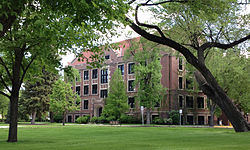Life
Frederick Keith was born in Iowa in 1879, worked as an art professor for Simpson College, Indianola, Iowa, where he designed an auditorium that was never built. [1] He married Eulah Goodhue of Indianola on January 15, 1902 [2] and they had a son in December 1902. [3] After the Carnegie Foundation awarded $10,000 to Indianola, Keith partnered with a local contractor named W.J. Beymer [4] and they opened an architectural firm in order to submit a bid for the design and construction of Indianola's free public library. The short-lived firm of Beymer & Smith submitted the lowest of six bids and built Indianola's Carnegie using local craftsmen and suppliers. [5] Keith, his wife and son left Indianola around 1905. He worked as designer and draftsman for Chicago architect Jarvis Hunt until 1914, when he went to Grand Forks. There, he worked for William J. Edwards, a prominent local designer. [6] In December 1915 he established an office in Grand Forks for himself. [7] In June 1916 he went west to Bismarck, the city with which he is most associated. [6] With the exception of a time of graduate work in Chicago from 1918–19, [8] he practiced independently until he associated with Fargo architect William F. Kurke in 1920. Keith & Kurke were the designated state architects, and designed the Liberty Memorial Building in Bismarck as well as many buildings on the campuses of the state schools. Keith & Kurke dissolved in 1926, and Keith returned to Chicago. He died there in 1954.
This page is based on this
Wikipedia article Text is available under the
CC BY-SA 4.0 license; additional terms may apply.
Images, videos and audio are available under their respective licenses.




